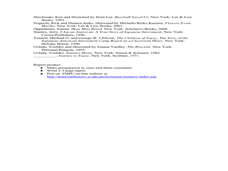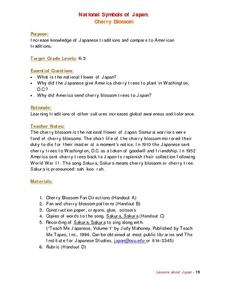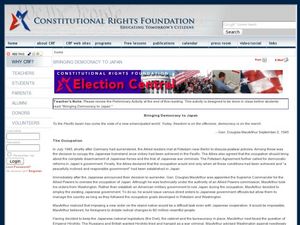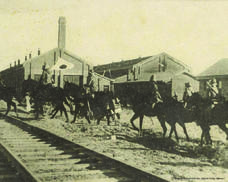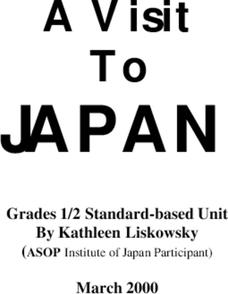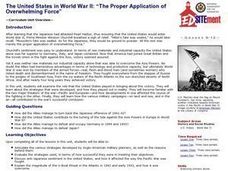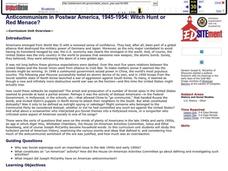Curated OER
A Ticket to Japan
Fourth graders discover similarities and differences in the lifestyles and geography of Utah and Japan. They use a Venn Diagram to compare and contrast daily life and geography in Utah with daily life and geography in Japan. They make...
Curated OER
Lesson III: Crisis, Pearl Harbor, Internment
The third in a series of lessons introduced by “A Fence Away From Freedom,” uses the Smithsonian website, “A More Perfect Union: Japanese Americans and the U.S. Constitution” and focuses on the section of the presentation devoted to the...
Curated OER
Feudal Japan and the Samurai
Students study the similarities of Feudal Japan and Europe. They show the feudal society of Japan, recognize the role of the samurai and identify the code of bushido.
Curated OER
National Symbols of Japan: Cherry Blossom
Students participate in a series of lessons that focus on the cherry blossom and its part in Japan and United States relations. They use a variety of media resources to gather information. The assessment is oral for lower grades. The...
Curated OER
Bringing Democracy to Japan
Students study a piece of Japanese contemporary history. In this democratic values lesson plan, students listen to their instructor lecture on the implementation of democratic government in Japan. Students respond to discussion questions...
Curated OER
National Symbols of Japan: The National Flag and Anthem
Students explore the traditions and cultures of Japan. Classmates identify national symbols in the United States and Japan. They listen to the lyrics of Japan's National Anthem.
Curated OER
Japan's Economic Miracle
Students explore the concepts of price and demand. In groups, pupils simulate the purchase and selling of land in Japan. They create a loan, and make decisions to buy or sell as the economic market fluctuates. Classmates discuss their...
Japan Society
The Russo-Japanese War, 1904-1905: A Turning Point in Japanese History, World History, and How War is Conveyed to the Public
The big question: How did Russo-Japanese War imagery and the press influence Japanese perception of the war? Learners consider this big question as they compare and contrast various artistic media from the period. The lesson is...
Curated OER
Tejana Military Members in World War II
Seventh graders discover who the Tejanas were and how they contributed to World War II. In this World War II lesson, 7th graders listen to their instructor discuss who the Tejanas were prior to researching the contributions of three of...
Curated OER
The Art and History of Japanese Calligraphy
Chinese and Japanese calligraphy is beautiful and significant in both culture and tradition. Engage your class in this expressive fine art form through a lesson on using, holding, and creating brush strokes common to Japanese writing...
Federal Reserve Bank
Natural Disasters: From Destruction to Recovery
What are the major economic implications, both good and bad, of natural disasters? Discover the effect that natural disasters can have on labor market conditions, capital, household incomes, and opportunities for reconstruction in local...
National WWII Museum
Picturing the War in the Pacific Photos, Datelines and Captions
Young historians have the opportunity to see photos from the war in the Pacific and learn more about what each photo represents. Scholars use their knowledge of WWII to match dates and descriptions to real-life photos from the war. The...
Curated OER
Textbook Changes in Japan
Learners recognize that the Japanese government has made attempts to alter history textbooks to make it look like the military did not play a major role in the mass suicides during the American invasion in 1945. They review vocabulary,...
Curated OER
A Visit to Japan
Studnets complete a variety of activities as they develop an awareness and appreciation of Japanese culture: geography, food, homes, holidays, celebrations, education, games, etc.
Japan Society
The Bubble Economy and the Lost Decade
Explore Japanese society and national identity. Class members share ideas about the Japanese economy and then investigate a series of resources, including an article, a film, a lecture, and a poem, to learn about Japan's Bubble Economy...
Curated OER
What's In a Name?
Students explore the relationship between names and certain cultures and locations. In this identity lesson, students create family migration or immigration maps. Students read excerpts from When My Name was Keoko and Lost Names: Scenes...
Curated OER
Victory in the Pacific, 1943-1945
High schoolers examine the military campaigns of the Pacific theater, tracing the path of the Allied offensives. The lesson presents what the Allies were trying to accomplish and why.
Curated OER
"The Proper Application of Overwhelming Force": The United States in World War II
Students examine the role that the U.S. played in bringing about victory in the two major theaters of the war in the Pacific and Europe. How the various military campaigns contributed to the war's successful conclusion forms the focus of...
Curated OER
Witch Hunt or Red Menace? Anticommunism in Postwar America, 1945-1954
Students investigate what constitutes an "un-American" activity and why Soviet espionage was such an important issue in the 1940's and 1950's. Joseph McCarthy's impact on American anticommunism is examined in this lesson. There are three...
Rutgers University
How the Allies Won World War II: Island-hopping in the Central Pacific
Using primary source documents, young historians explore the strategies the US used to defeat Japan during WWII. They also learn about the American military experience, and innovations that changed the style of warfare. Students benefit...
Montana State University
One Mountain, Many Cultures
Americans may think of Mount Everest as a region dedicated to adventurous hikers, but many cultures have flourished there! Learners read informative books, watch videos, participate in classroom discussion, analyze folk tales, and...
Curated OER
Japan: Yesterday and Today
Middle schoolers study the geography and culture of Japan and discover important historical events. They look at the religions of Japan. They determine similarities and differences in the lives of teenagers in Japan and the US. They read...
Curated OER
Social and Cultural Scene
Ninth graders examine the Imperial Era of Japan. In this World History lesson, 9th graders address the social and cultural aspects or history. students are given various true incidents and should understand that personal stories...
Curated OER
Examining Gandhi’s Critique of Modern Civilization: The Lessons of Modern Japan
Students examine the political philosophies of Mohandas Gandhi. In this Mohandas Gandhi instructional activity, students investigate Gandhi's thoughts about modern civilization as they listen to a lecture presented by their instructor.



